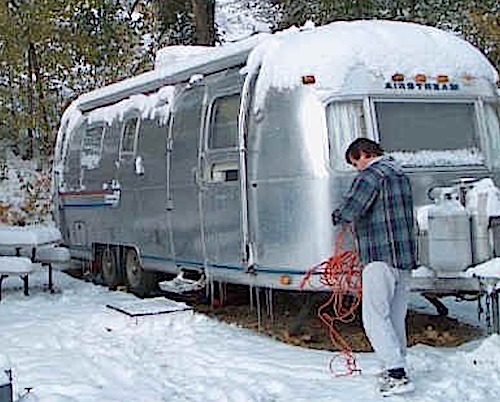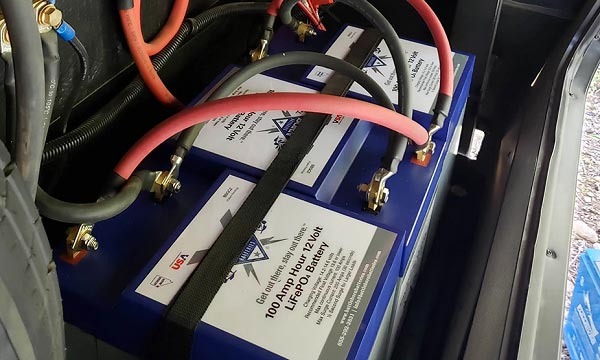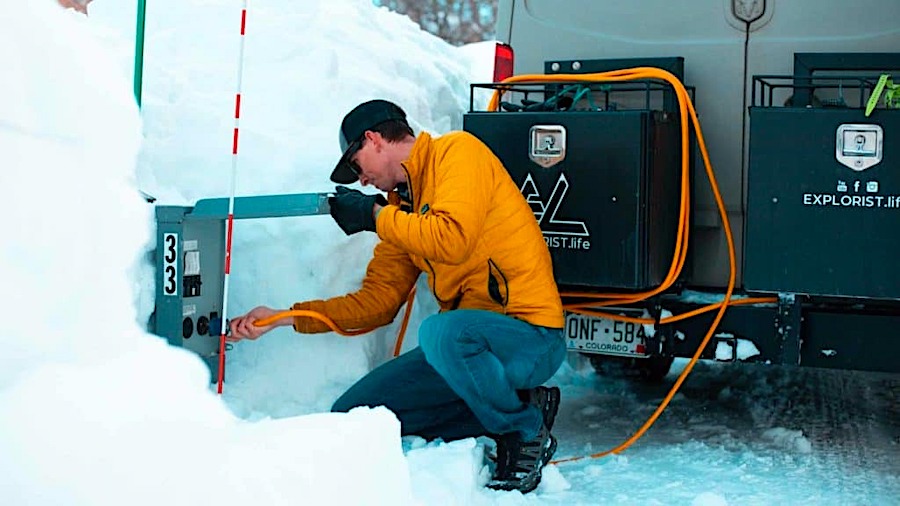Thanks for your support! If you make a purchase using our links in this article, we may make a commission. And, as an Amazon Associate, I earn from qualifying purchases. See the full disclosure here.
When you purchase an RV there are a lot of things for you to learn. Not everyone is familiar with all the intricacies of RV maintenance. As a result, you need to do your research to ensure that you do everything correctly. Without doing the proper research you could find yourself in a situation where you have done damage to your RV.
One question that is often brought up by new RV owners is should you leave your RV plugged in during the winter. Although you would think this has a simple answer, it is actually fairly complicated. There are plenty of reasons for why you should leave it plugged in, but there are also several reasons as to why you should not.
Leaving your RV on can help ensure that no cold related damage happens to your RV. However, it is also much more expensive to do this, and it will lower the lifespan of your RV. So, you need to find a balance between the two so that you get the best of both options.
Reasons to Leave Your RV Plugged in All Winter
When you decide to step away from your RV for the winter you need to decide if you want to leave it plugged in for the winter. This is a big decision to make and there are several reasons why should leave it plugged in.
If you leave your RV plugged in, you can leave the heat on and this can have significant benefits. By leaving your heat on you are ensuring that you will not need to deal with any portions of your RV freezing. Specifically, you do not need to worry about your pipes freezing. Getting your pipes fixed can be incredibly expensive, so avoiding a freeze is essential.
Conversely, if you live in a warmer climate it does not hurt to leave your RV plugged in so that you can leave the air conditioning unit on. By doing this you can keep you RV cool so that you can take it out during the off-season if you wish.
Additionally, by keeping your RV plugged in you can keep your batteries topped off so that they are ready to go as soon as you are ready to take your RV out on the road again.
You can also keep your fridge on during the winter when you keep your RV plugged in. This is beneficial because you likely will have leftover food that you would need to move otherwise. This way you do not need to worry about moving food from your RV to your house.
It is also nice to have your RV available for extra housing if you need it. If you have lots of family coming over for Christmas, you might not have the space for everyone in your house. However, if leave your RV plugged in, you will have a few extra beds.

Why You Should Not Leave Your RV Plugged in All Winter
As you can see there are plenty of reasons to keep your RV plugged in during the winter, but there are also some reasons not to do this. Firstly, you need to consider the cost of keeping your RV running the entire winter when you are not using it. Your electric bill will be much more expensive if you need to pay for your RV to run. The same is true for your heat and gas bill. You will also need to refill your propane tank more often, so that is another expense right there.
Additionally, you need to worry about the durability of your RV. When you leave your RV running, there will be wear and tear on your devices. As a result, you will need to do more upkeep on things like your heating system, air conditioner, batteries, and plumbing. We also mentioned above that it is nice to leave your fridge on so that you do not need to move all your food. However, this means that you will need to clean it out and defrost it during the spring.
Finally, by unplugging your RV you will be improving the health of your batteries long term. Batteries are not meant to be charging every second of every day. They need time where they are not plugged into the charger to keep their health. If you have a new RV with a smart charger it will trickle charge your batteries. In this situation you can leave them plugged in. However, in an older RV leaving them plugged in for an extended period of time will do serious damage.
If you decide to unplug your RV, take your batteries and move them somewhere warm. Cold climates can do damage to batteries over time, so avoid that if possible.
Do RV Batteries Charge When Plugged Into Shore Power?
When you are at a campsite you most likely have access to shore power, and when you plug into shore power it will charge your RV batteries. When you are plugged into shore power all your fans, lamps, your water pump, and everything else will operate on 12 volts DC. That is as long as the DC electricity is still provided by your converter instead of your batteries while they are charging. If you do not have a converter that works properly then you will not be able to run your appliances while your batteries charge.

How Can I Keep My RV Batteries Charged All Winter?
When you decide to pack up your RV for the winter, one of your biggest concerns should be the state of your batteries. Generally, you do not need to leave them charging for the entire winter because they will overcharge. Overcharging your batteries will seriously hurt the health of your batteries.
If you do not know what overcharging means, overcharging is when you leave something plugged in after it is charged to 100%. What happens when you do this is the device does not stop being charged. Instead, it still receives small trickle charges. When the battery receives these trickle charges the internal chemistry of the battery is damaged. As a result, the battery health is damaged, and a charge will not last as long.
Conversely, you do not want your battery to die all the way. You can get away with letting this happen to your RV batteries a few times, but it is extremely dangerous to let happen more than once or twice. When this happens your battery stability will be affected, and it will no longer be able to take on a full charge.
Over time it is inevitable that the health of your batteries will diminish. However, there are things you can do to delay this process. During the winter you should do your best to make sure that your RV batteries do not drop below 80%. This is because you lose 10% of your battery capacity when they are idle.
So, you need to make sure that they are getting a little bit of use to maintain their health. However, you still need to make sure that you do not overcharge your batteries. So, you need to keep an eye on them and plug and unplug them accordingly.
Prepare Your RV for Winter So That You Are Ready for Your First Summer Trip
After reading, we hope you have all the information you need to prepare your RV for the winter. We know that there is a lot of information to absorb, but it should all be helpful as you prepare your RV for the long winter months. With this information you will be better prepared for the winter, and as a result, you will be better prepared to start things up again in the summer.
Your RV batteries are a difficult thing to manage. You want to make sure they do not die during the winter, but you also do not want to risk overcharging them. Both scenarios would result in the batteries health being damaged. So, you need to monitor your batteries frequently so that that their charge level does not go too far in either direction.
There are plenty of reasons to keep your RV plugged in during the winter, but there are also several reason to leave it unplugged. You need to decide if the pros of leaving your RV plugged in outweigh the cons. The answer to that question will be different for different people, so you need to decide for yourself.
Are you a new or experienced RV owner? Are you interested in taking your RV out during the winter? Do you think you will keep your RV plugged in during the winter? Let us know in the comments!



I put my Class A on a timer it charges 10 hrs a day off 14 hrs over night.
“ Generally, you do not need to leave them charging for the entire winter because they will overcharge.” – not true in most modern RVs that have smart battery chargers that go automatically into float mode and will never overcharge the batteries.
Where does the inverter for the fridgecome into play? Is it best to turn it ofoff if you leave rv plugged in for a couple months while not in use?
Please advise
We left ours plugged in all winter. We turned the inverter off. We did winterize it first. This spring we had to purchase all new batteries. They said they were overcharged and nearly welded together. He suggested plugging in for 2 weeks and then unplug for 2 weeks. Hopefully that works this winter and we won’t need to purchase batteries.
Any thoughts on starting Class A motorhome how often in the winter and let it run for how long if you can’t keep plugged in to keep batteries from freezing?
I leave my rv plugged in all the time but have a timer in between the power source and my unit, turns on each day for 2 hours….seems to be ok, opinions?
Trickle chargers do not harm your batteries. Trickle chargers are actually good for your batteries. We turn all of our master switches off and winterize our RV. Then we put our batteries on trickle chargers. This will extend the life of your batteries substantially. Plus you won’t have to worry about your pipes accidentally freezing if something goes wrong!
I did leave mine plugged in all winter last season (Minnesota). I thought about the possibility of over charging, but also realized that there will be a constant drain from the gas and monoxide sensors. Just need to keep an eye on the electrolyte level in each cell and all should be fine. Normally I take the battery out and keep it in my heated garage, put a charger on it for 12 hours every month.
Hi Mike, I always leave my camper travel-trailer plugged in to keep the interior warm with a stand-up oil filled heater running on low. I drain water tanks…fresh water, grey n black water, and water heater. Plus I open the toilet valve so it doesn’t freeze below 20 degrees. We get in the teens during winter.
I’m rethinking my routine as I have AGM batteries and 200 watts of solar but I think I’m still gonna keep it plugged in. I’ll check with my friends at Batteries Plus. Thanks for the post.
Dan Q.
Hi Dan,
Let me know what the guys at Batteries Plus say.
Thanks
Mike
My wife and I live in Eugene Oregon here the winters are some what mild down into the 20’s a little but mostly above freezing so we have a unit called a wave warmer that we leave on the dinning table. It heats the air around the interior of our Class C above freezing and the air dry all winter so we don’t need to add antifreeze stuff in our water lines we do drain all water from holding tanks ( dry camping water,gray water, black water.) before covering up our class C for the winter. I do leave the shore power on for the wave warmer and open the door under the bed so air can stay dry as well a light in the back storage area where blocks and B B Q is stored at the rear of the coach